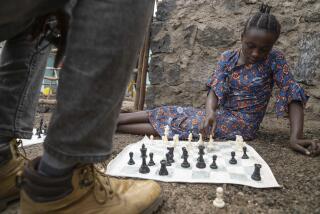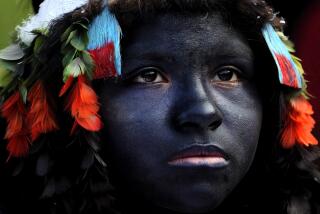Pygmies in Cultural No-Man’s-Land
- Share via
KINSHASA, Congo — Yongela Bongo kept the secret from her husband for the entire seven years they were married. But when he finally discovered the truth, he kicked her out on the street--keeping their six children and all their belongings.
Bongo’s failing? To have been born one of the 600,000 Pygmies who live in the Central African nation of Congo.
“I had managed to hide my identity for seven years, but I knew that the day my husband would discover it, it would end that way,” says Bongo, who sits wrapped in a dusty cloth in an unfinished stone church.
Pygmies, not all of whom are below-average height, are believed to be the earliest inhabitants of Central Africa. Over the centuries they retreated into the region’s dense rain forests to keep away from the more powerful Bantu tribes.
The legendary hunters, who use traditional spears, bows and snares, had the tangled wilderness to themselves until recent times. Then, commercial hunters armed with automatic rifles and an expanding logging industry began encroaching on their jungle sanctuary.
When Congo’s civil war broke out in 1998, many Pygmies were forced to abandon their traditional way of life for the cities, where the once-proud people now live in harsh poverty and face intense prejudice.
Unable to visit her own children, Bongo lives with her brother and ekes out a living selling peanuts on the streets of the capital, Kinshasa.
Pygmy representatives, who gathered recently under a roof of branches on the shores of one of the city’s many rivers, are bitter.
“No Pygmy holds any position in the government at any level,” complains Caicha W’Otshimo Osambi, a rare educated Pygmy who is chairman of the tribe’s Kinshasa association.
In a country where corruption and tribalism have been the norm for 40 years, exclusion from power can mean exclusion from society.
For the Pygmies, this isolation goes back centuries.
Long taken as slaves by the Bantu tribes who dominate sub-Saharan Africa, Pygmies were also sold to foreign traders for export.
“Our Congolese brothers made a point of selling us to the Arab merchants,” says Jean-Louis Ebango. “So we had to flee civilization.”
Pygmies moved deeper and deeper into Congo’s thick forests, turning to traditional beliefs in magic to afford some security from outsiders.
Ngoma Esale, a traditional Pygmy chief, is covered with shells and dried animal skins. “This protects me and my community,” explains the father of 16.
But such amulets seem to have little effect against long-standing traditions, including the custom of burying a Bantu chief with a few live Pygmies to serve the dead leader in the next life.
“My 5-year-old nephew was buried that way,” Esale says. “A Bantu middleman was given money to capture some Pygmy children to be buried alive with his traditional chief.”
In 1967, dictator Mobutu Sese Seko encouraged Pygmies to come out of the bush and help develop the country. Ebango now wonders whether they were right to heed his call.
Ten years later, Pygmies were forcibly recruited to take part in Mobutu’s 80-day war with secessionist rebels in the southern province of Katanga.
“We weren’t given proper weapons. We just used our spears and arrows. Hundreds of our Pygmy brothers died,” Ebango says.
Many Pygmies remember the lesson and refuse to take part in Congo’s current conflict. But their suffering continues.
Before the fighting started--drawing in six foreign armies and at least three rebel groups--Ebango made a living buying animals from Pygmy hunters in the bush and selling them at Kinshasa’s markets. The war forced him to abandon the trade.
“When you come back from the forest, it is impossible to enter the towns,” he explains. “Local authorities immediately suspect you of communicating with the rebels.”
Like many Pygmies, he now works as a servant for a wealthy Congolese family.
With his meager salary, he cannot afford to send his children to school. All day long, the kids play around a few tiny mud houses into which families of more than 10 people are sometimes packed.
“My ancestors had escaped from slavery, but I am now working as a servant,” he says. “I am not proud.”
More to Read
Sign up for Essential California
The most important California stories and recommendations in your inbox every morning.
You may occasionally receive promotional content from the Los Angeles Times.













